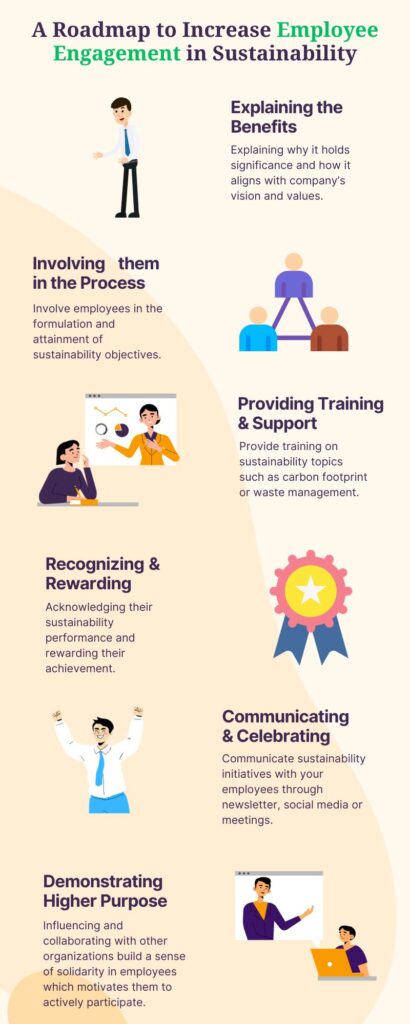Here’s A Simple Roadmap to Increase Employee Engagement in Sustainability

Find here how you can enhance employee engagement in sustainability to establish a culture of environmental responsibility within your organization.
In an era defined by increasing environmental consciousness and corporate social responsibility, sustainability has emerged as a pivotal concept for both businesses and society at large. It’s not merely a buzzword, but a fundamental shift in the way organizations operate and interact with the world. To make significant progress in the pursuit of sustainable business practices, employee engagement has become a linchpin.
Here are the steps below:
Explaining the Benefits
One of the initial steps in cultivating employee engagement in sustainability involves explaining why it holds significance and how it aligns with your company’s vision and values. Utilizing narratives, data, and illustrations, you can illustrate the positive impact of your sustainability endeavors on stakeholders, customers, and communities. Additionally, you can underscore the personal advantages for your employees, including the acquisition of new skills, bolstering their well-being, and propelling their careers.
Involving Them in the Process
Involve them in the formulation and attainment of sustainability objectives. You can seek their input, ideas, and recommendations on how to enhance environmental performance and curtail your ecological footprint. Establishing cross-functional teams, committees, or task forces to spearhead and execute specific sustainability projects or initiatives is another approach. By affording your employees a voice and a role in your sustainability strategy, you can augment their sense of ownership, dedication, and motivation.
Providing Training and Support
It is imperative to furnish them with the requisite training and support to enhance their knowledge, skills, and competencies. Options include offering online or in-person courses, workshops, webinars, or mentoring programs covering a spectrum of sustainability topics, such as carbon footprint, waste management, renewable energy, eco-friendly commuting, or social responsibility. Additionally, equipping them with tools, resources, and guidelines to facilitate the integration of sustainable practices into their daily tasks is crucial.
Recognizing and Rewarding

Another highly effective strategy is acknowledging and rewarding their contributions and achievements. This can be accomplished through presenting certificates, badges, bonuses, prizes, or public recognition as gestures of appreciation for their role. The introduction of an incentive system, gamification, or competitions can further incentivize and challenge them to enhance their sustainability performance and results.
Communicating and Celebrating
Finally, to instill employee engagement communicate and celebrate the progress and outcomes. Various communication channels, such as newsletters, social media, or meetings, can be used to disseminate stories, data, and feedback on your sustainability initiatives with your employees. These platforms can also be utilized to showcase your employees’ exemplary practices, success stories, and testimonials. Additionally, organizing events, activities, or campaigns to commemorate sustainability milestones and achievements can foster a sense of community and pride among your employees.
Demonstrating Higher Purpose by Creating Transformational Change
Prominent sustainability-driven enterprises share a common aspiration: to effect substantial change by influencing and collaborating with other organizations, be it within their value chain or among industry competitors. This collaborative approach instills a sense of solidarity in employees as they recognize that sustainability is not solely a personal endeavor or a concern limited to their own company. Rather, it is a societal matter with global ramifications, an awareness that motivates them to actively participate.
Challenges
Resistance to Change
Some employees may resist sustainability initiatives, perceiving them as additional work or a threat to their usual routines. Overcoming this resistance requires effective change management and clear communication.
Lack of Awareness
Many employees may not fully understand the concept of sustainability or its relevance to their roles. Education and communication are vital to address this issue.
Short-Term Focus
Employees might prioritize short-term gains over long-term sustainability, leading to actions that are counterproductive to the organization’s sustainability goals. Aligning incentives and performance metrics can help address this challenge.
Resource Constraints
Limited resources, both in terms of finances and personnel, can hinder the ability to implement sustainability initiatives effectively. Resource allocation should be strategic to maximize impact.
Conclusion
Employee engagement in sustainability is not merely a desirable add-on but an essential component of building a greener, more sustainable future. By prioritizing it organizations can strengthen their commitment to the environment, enhance their reputation, and contribute to a more sustainable world for generations to come.
India’s first climate action platform, The Disposal Company, is paving the way for a greener future by providing brands with the tools they need to achieve plastic neutrality and carbon neutrality. Learn more here.





